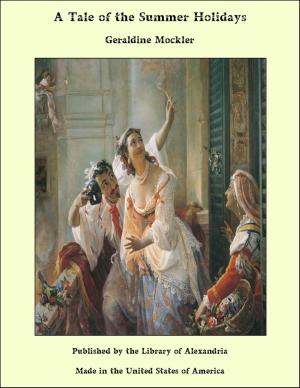The Prophet of Berkeley Square
Nonfiction, Religion & Spirituality, New Age, History, Fiction & Literature| Author: | Robert Smythe Hichens | ISBN: | 9781465551276 |
| Publisher: | Library of Alexandria | Publication: | March 8, 2015 |
| Imprint: | Language: | English |
| Author: | Robert Smythe Hichens |
| ISBN: | 9781465551276 |
| Publisher: | Library of Alexandria |
| Publication: | March 8, 2015 |
| Imprint: | |
| Language: | English |
MRS. MERILLIA IS CARRIED TO BED The great telescope of the Prophet was carefully adjusted upon its lofty, brass-bound stand in the bow window of Number One Thousand Berkeley Square. It pointed towards the remarkably bright stars which twinkled in the December sky over frosty London, those guardian stars which always seemed to the Prophet to watch with peculiar solicitude over the most respectable neighbourhood in which he resided. The polestar had its eye even now upon the mansion of an adjacent ex-premier, the belt of Orion was not oblivious of a belted earl's cosy red-brick home just opposite, and the house of a certain famous actor and actress close by had been taken by the Great Bear under its special protection. The Prophet's butler, Mr. Ferdinand—that bulky and veracious gentleman—threw open the latticed windows of the drawing-room and let the cold air rush blithely in. Then he made up the fire carefully, placed a copy of Mr. Malkiel's Almanac, bound in dull pink and silver brocade by Miss Clorinda Dolbrett of the Cromwell Road, upon a small tulip-wood table near the telescope, patted a sofa cushion affectionately on the head, glanced around with the meditative eye of the butler born not made, and quitted the comfortable apartment with a salaried, but soft, footstep. It was a pleasant chamber, this drawing-room of Number One Thousand. It spoke respectfully of the generations that were past and seemed serenely certain of a comfortable future. There was no too modern uneasiness about it, no trifling, gim-crack furniture constructed to catch the eye and the angles of any one venturing to seek repose upon it, no unmeaning rubbish of ornaments or hectic flummery of second-rate pictures. Above the high oaken mantel-piece was a little pure bust in marble of the Prophet when a small boy. To right and left were pretty miniatures in golden frames of the Prophet's delightfully numerous grandmothers. Here might be seen Mrs. Prothero, the great ship-builder's faithful wife, in blue brocade, and Lady Camptown, who reigned at Bath, in grey tabinet and diamond buckles, when Miss Jane Austen was writing her first romance; Mrs. Susan Burlington, who knew Lord Byron—a remarkable fact—and Lady Sophia Green, who knew her own mind, a fact still more remarkable. The last-named lady wore black with a Roman nose, and the combination was admirably convincing. Here might also be observed Mrs. Stuefitt, Mistress of the Mazurka, and the Lady Jane Follington, of whom George the Second had spoken openly in terms of approbation. She affected plum colour and had eyes like sloes—the fashionable hue in the neat-foot-and-pretty-ankle period. The flames of the fire twinkled brightly over this battalion of deuced fine women, who were all, without one exception, the grandmothers—in various degrees—of the Prophet. When speaking of them, in the highest terms, he never differentiated them by the adjectives great, or great-great. They were all kind and condescending enough to be his grandmothers. For a man of his sensitive, delicate and grateful disposition this was enough. He thought them all quite perfect, and took them all under the protection of his soft and beaming eyes. Of Mrs. Merillia, the live grandmother with whom he had the great felicity to dwell in Berkeley Square, he seldom said anything in public praise. The incense he offered at her shrine rose, most sweetly perfumed, from his daily life. The hearth of this agreeable and grandmotherly chamber was attractive with dogs, the silver cage beside it with green love-birds. Upon the floor was a heavy, dull-blue carpet over which—as has been intimated—even a butler so heavy as Mr. Ferdinand could go softly. The walls were dressed with a dull blue paper that looked like velvet
MRS. MERILLIA IS CARRIED TO BED The great telescope of the Prophet was carefully adjusted upon its lofty, brass-bound stand in the bow window of Number One Thousand Berkeley Square. It pointed towards the remarkably bright stars which twinkled in the December sky over frosty London, those guardian stars which always seemed to the Prophet to watch with peculiar solicitude over the most respectable neighbourhood in which he resided. The polestar had its eye even now upon the mansion of an adjacent ex-premier, the belt of Orion was not oblivious of a belted earl's cosy red-brick home just opposite, and the house of a certain famous actor and actress close by had been taken by the Great Bear under its special protection. The Prophet's butler, Mr. Ferdinand—that bulky and veracious gentleman—threw open the latticed windows of the drawing-room and let the cold air rush blithely in. Then he made up the fire carefully, placed a copy of Mr. Malkiel's Almanac, bound in dull pink and silver brocade by Miss Clorinda Dolbrett of the Cromwell Road, upon a small tulip-wood table near the telescope, patted a sofa cushion affectionately on the head, glanced around with the meditative eye of the butler born not made, and quitted the comfortable apartment with a salaried, but soft, footstep. It was a pleasant chamber, this drawing-room of Number One Thousand. It spoke respectfully of the generations that were past and seemed serenely certain of a comfortable future. There was no too modern uneasiness about it, no trifling, gim-crack furniture constructed to catch the eye and the angles of any one venturing to seek repose upon it, no unmeaning rubbish of ornaments or hectic flummery of second-rate pictures. Above the high oaken mantel-piece was a little pure bust in marble of the Prophet when a small boy. To right and left were pretty miniatures in golden frames of the Prophet's delightfully numerous grandmothers. Here might be seen Mrs. Prothero, the great ship-builder's faithful wife, in blue brocade, and Lady Camptown, who reigned at Bath, in grey tabinet and diamond buckles, when Miss Jane Austen was writing her first romance; Mrs. Susan Burlington, who knew Lord Byron—a remarkable fact—and Lady Sophia Green, who knew her own mind, a fact still more remarkable. The last-named lady wore black with a Roman nose, and the combination was admirably convincing. Here might also be observed Mrs. Stuefitt, Mistress of the Mazurka, and the Lady Jane Follington, of whom George the Second had spoken openly in terms of approbation. She affected plum colour and had eyes like sloes—the fashionable hue in the neat-foot-and-pretty-ankle period. The flames of the fire twinkled brightly over this battalion of deuced fine women, who were all, without one exception, the grandmothers—in various degrees—of the Prophet. When speaking of them, in the highest terms, he never differentiated them by the adjectives great, or great-great. They were all kind and condescending enough to be his grandmothers. For a man of his sensitive, delicate and grateful disposition this was enough. He thought them all quite perfect, and took them all under the protection of his soft and beaming eyes. Of Mrs. Merillia, the live grandmother with whom he had the great felicity to dwell in Berkeley Square, he seldom said anything in public praise. The incense he offered at her shrine rose, most sweetly perfumed, from his daily life. The hearth of this agreeable and grandmotherly chamber was attractive with dogs, the silver cage beside it with green love-birds. Upon the floor was a heavy, dull-blue carpet over which—as has been intimated—even a butler so heavy as Mr. Ferdinand could go softly. The walls were dressed with a dull blue paper that looked like velvet















